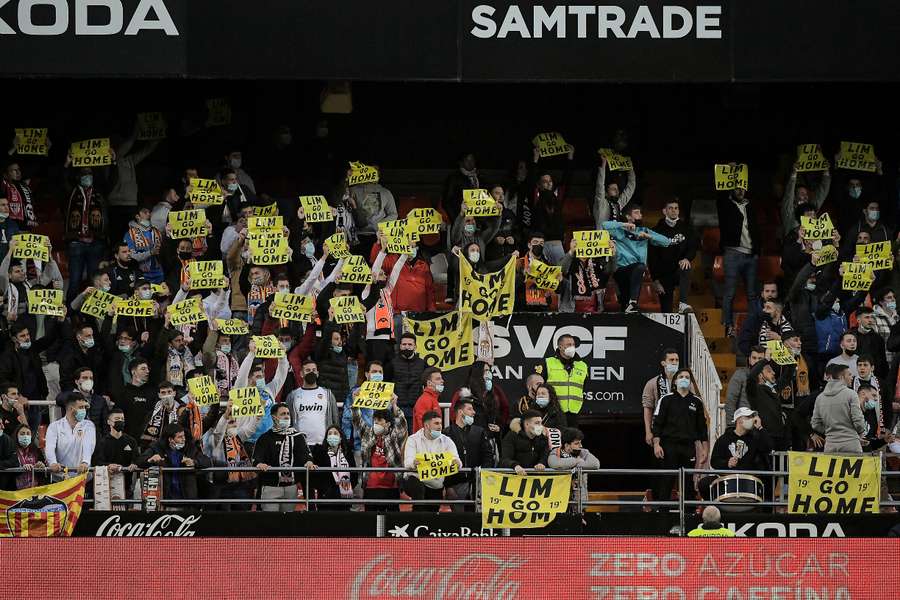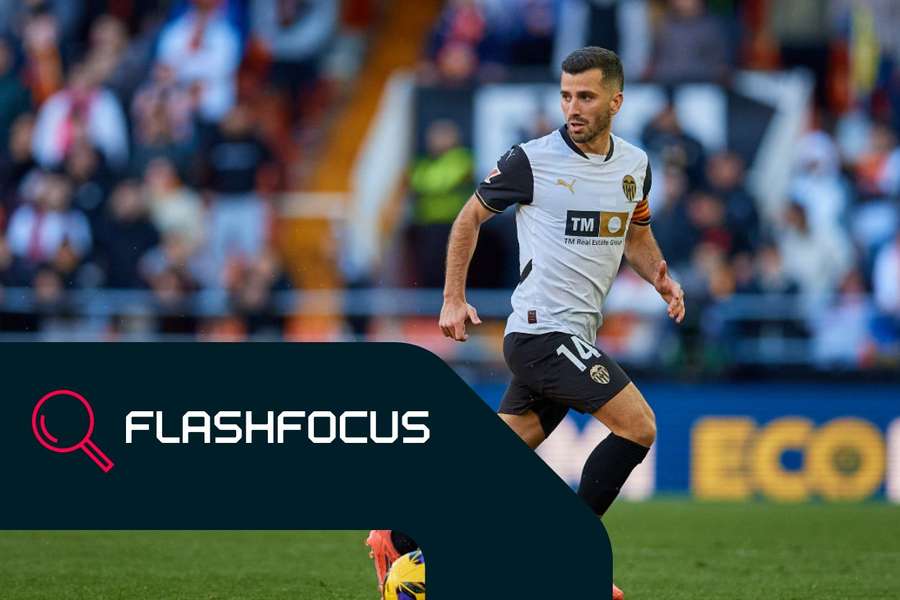However, their current situation is very different to their glorious past. Los Che find themselves in LaLiga's relegation zone, nineteenth, and four points from safety. What has happened in recent years to make the fifth most successful club in Spanish football history struggle to survive in the top flight?
Let's go back to 2010, a historic year for Spanish football, culminating in the victory of the national team at the World Cup in South Africa with an iconic squad. Valencia, then under Unai Emery, finished the 2009/10 season in third place, which meant qualifying for the next edition of the Champions League. However, financially, things were not going so well for the club...
The departures of Villa and Silva
A year earlier, Manuel Llorente was appointed club president thanks to the capital increase, with the aim of avoiding insolvency proceedings, balancing the accounts and reducing the financial debt, which amounted to 550 million euros.
In the summer of 2010, the club was forced to sell two of its main assets, who would end up contributing to Spain becoming world champions. David Villa signed for Barcelona and David Silva for Manchester City for 40 and 30 million euros respectively.
However, on a sporting level, the situation remained good. Emery had the team finish in third place for two more seasons, just behind Barcelona and Real Madrid, who hyped their rivalry in the Guardiola-Mourinho era.
In 2011/12, Valencia reached the semi-finals of the Europa League, where they were knocked out by Atletico Madrid.
Despite on-field success, Valencia needed to continue selling to reduce the debt and in 2011 another world champion, Juan Mata, left for Chelsea. He would not be the only top player to leave the club during those years. The club also had to let go of Joaquin (in 2011) and Jordi Alba (in 2012).
Emery's contract was not renewed in 2012 and Mauricio Pellegrino arrived, who was sacked halfway through the next season. Under Ernesto Valverde, Valencia then finished fifth. A year later, with Juan Antonio Pizzi at the helm, the team finished eighth, although they reached the semi-finals of the Europa League, where they lost to Sevilla.
On an institutional level, Llorente resigned in 2013 and Amedeo Salvo took over the presidency after the Valencia CF Foundation was unable to pay the interest on a loan that the club had outstanding with financial institution Bankia. More key players then left: David Albelda and Roberto Soldado.
The arrival of Peter Lim
The serious financial situation led to the sale of the majority stake in the club to Singaporean tycoon Peter Lim, through the company Meriton Holdings, in 2014.
The new owner appointed Nuno Espirito Santo as coach. With Nicolas Otamendi and Shkodran Mustafi at the back, Jose Gaya, Dani Parejo, Alvaro Negredo and Rodrigo, the club finished fourth and returned to the Champions League in the first year of Lim's ownership.
In 2015, Amedeo Salvo, who was still president, resigned due to disagreements with Meriton. He was replaced by Lay Hoon Chan, who stayed at the helm for two years, although he would end up returning in 2022.
Between 2015 and 2017, Valencia underwent a crisis in results that saw them finish twelfth for two consecutive seasons. Lim opted for the inexperienced Gary Neville as manager, who lasted just 28 games. With Voro as a firefighter in between, Pako Ayestaran arrived on the bench, followed by Cesare Prandelli. The Italian resigned when he realised that Lim did not want to invest in the club.
In 2017/18, with Anil Murthy as the new president, Mateu Alemany as general manager and Marcelino on the bench, Valencia underwent a period of sporting renaissance. Two years in a row, they finished fourth in LaLiga, allowing them to contest the Champions League and the cup title in 2018/19 after beating Barcelona in the final. It was the team of Parejo, Carlos Soler, Goncalo Guedes, Kevin Gameiro and Rodrigo. However, that success was to be the beginning of the end.
Sporting regression
A very discreet 2019/20 season ended with Valencia in ninth place in the league. The club sold Ferran Torres and Francis Coquelin and gave Parejo to Villarreal. The fans got fed up with Peter Lim and the first demonstrations began, which continue to this day, against the board.
There were non-payments to some footballers, who were offered promissory notes. No reinforcements arrived and Lim failed to keep all his promises. The Singaporean stopped appearing at Mestalla around this time.
The following seasons reflected the decline of the club. Thirteenth in 2020/21, ninth in 2021/22 although cup finalists, sixteenth in 2022/23 with Ruben Baraja on the bench, and ninth in 2023/24.
Along the way, in addition to Pipo, Albert Celades, Javi Gracia, Pepe Bordalas and Gennaro Gattuso all took over the reins as well as Voro, who has been in charge seven times in this tumultuous period, five of them under Lim.
Since Baraja's departure, Carlos Corberan has been in charge of steering the ship towards safety. As for the presidency, Lay Hoon Chan returned to the hot seat in 2022.

Controversial purchase of players
When Lim bought the club, he made several promises that have not been fulfilled. Among them, that he would finish the stadium before the club's centenary (it was back in 2019), that he would complete the transaction as soon as possible, rebuild the club and capitalise it in sporting terms and that if there were any non-payment, he would demand guarantees and assume all the club's commitments.
But it has not all been just a matter of unfulfilled promises. Several former directors have accused Lim of enriching himself by buying players.
For example, Antonio Francisco Sese, who together with partners Jorge Verdaguer and Alberto Talora filed a lawsuit in 2020 against Lim, Murthy, Lay Hoon Chan and Jorge Mendes for this reason.
According to this lawsuit, the Singaporean owner and the Portuguese agent allegedly used the club's coffers to make money by buying players, all of them above their value and some of them injured, through interposed companies, which caused the technical bankruptcy of Valencia.
According to the complaint, the purchase of Andre Gomes and Rodrigo from Benfica was made by Meriton Capital, before Lim was the maximum shareholder. Rodrigo cost 30 million, despite his value being 17.3 million, while Gomes was bought for 15 million, his net worth being 5.4 million. And these are just two of many cases.
According to lawyer Miguel Duran: "As a consequence of the abusive agreement imposed by Lim exercising his majority, it is the club who pays the 30 and 15 million euros, respectively for both players, which means that it is really Valencia CF, to the detriment of its partners and to the benefit of Lim and Mendes."
Meanwhile, demonstrations against Lim have been taking place in recent years around Mestalla. Banners with the slogan 'Lim go home' have become a classic and the club's situation, at an institutional level, is untenable.
Even a Valencianista couple on their honeymoon were arrested in Singapore last October and had their passports taken away for six days for going to their house and putting up a sticker and displaying a banner with the slogan 'Lim go home'.
The future and the new stadium
All indications are that after more than 10 years at the helm of the club, Peter Lim's tenure is nearing its end. The club's debt has been refinanced thanks to Goldman Sachs and the Singaporean businessman seems to be open to selling the club, for which he is asking 400 million euros, plus a debt that reaches 700 million euros.
It should not be forgotten that in December alone, with the dismissal of Baraja and the arrival of Corberan, the club squandered seven million euros. However, for the sale to be possible, stability is essential.
Finally, the club's current situation cannot be understood without the Nou Mestalla. The construction of the stadium started in 2007 and was halted in 2009 due to the club's debt.
On October 4th, 2023, it was made official that the 2030 World Cup would be hosted by Spain, Portugal and Morocco. However, on July 19th, 2024, the RFEF announced the 11 Spanish venues and Valencia, the country's third-most populous city, was not among those chosen.
Four days later, the Valencia city council, which had previously granted planning permission to resume construction, approved the club to continue work, in exchange for a series of conditions.
On January 10th this year, after 16 years without movement, the club resumed work on the Nuevo Mestalla.
In parallel, recently, the new president of the RFEF, Rafael Louzan, has assured that "Valencia is going to host the 2030 World Cup", despite the fact that it was not initially included.

